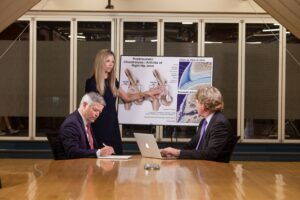When preparing for car accident cases, my clients often ask if we can obtain any statements that the other driver made to their insurance company following the crash. The answer is complex, and hinges on whether the defendant can successfully assert the “work product doctrine.” This doctrine would shield any such statement during the discovery (or information-gathering) phase of the case.

Discovery of post-accident statements
After a personal injury case is filed and before the trial occurs, the case proceeds through the “discovery” phase. This is the pre-trial period during which both the plaintiff and defendant are required to disclose information related to the case. This includes:
- Police reports
- Investigations
- Insurance information
- Medical records
- Billing
In Virginia, requests for information which are “reasonably calculated to lead to the discovery of admissible evidence” are generally permitted, unless the opposing party can assert a specific objection.
When I file a new case on behalf of a client, I always request a copy of any recorded statement that the defendant gave to their insurance company following the crash. These statements are important because they were made when the defendant’s memories were fresh and before the prospect of legal proceedings.
Sometimes the defense will provide a transcript of the defendant’s statement. Other times, the statement is not produced, and instead, the defense asserts an objection to the request based on the “work product doctrine.”
What is the work product doctrine?
The work product doctrine is the rule that states that documents prepared in anticipation of litigation or trial are available to the opposing party only if 1.) the party requesting the document can prove that there is a substantial need for the document or 2.) if the party requesting the document is unable to gather a substantial equivalent by other means, without undue hardship. I will explain both of these concepts.

Documents or materials created “in anticipation of litigation”
The most important question when resolving a dispute over the work product doctrine is whether a statement made by a defendant was “in anticipation of litigation.” If the statement was not taken in anticipation of litigation, then it must be provided to the plaintiff. But if the statement was taken in anticipation of litigation, then the plaintiff may only obtain the statement by showing that it is substantially needed in the case and that withholding it would create an “undue hardship” for obtaining the statement by other means.
Undue hardship is a very difficult showing to make, because there are additional methods of obtaining the defendant’s version of events. The plaintiff can issue the defendant interrogatories (written questions which must be answered under oath), and/or take the defendant’s deposition (an oral examination under oath).
It has proven very difficult for courts to decide whether a party’s statement to their insurance company was made in anticipation of litigation, as opposed to merely in the regular course of the insurance company’s business. As the federal district court for the Western District of Virginia has stated:
[E]ven though litigation is already in prospect, there is no work product immunity for documents prepared in the regular course of business rather than for purposes of litigation . . . This approach realistically recognizes that at some point, an insurance company shifts its activity from the ordinary course of business to anticipation of litigation, and no hard and fast rule governs when this change occurs . . . This distinction lies at the pivotal point where the probability of litigation the claim is substantial and imminent, . . . or where litigation was fairly foreseeable at the time the [information] was prepared[.]

A split of authority
In Virginia law, there is no bright line rule stating that every post-accident statement made by a driver to an insurance company either is or is not protected. Instead, the published judicial opinions which address this issue consider different factors in deciding whether the statement was taken in anticipation of litigation, or “in the ordinary course of business.” Those factors must be applied to the specific facts of any given case.
To make matters worse, the Virginia Supreme Court, which is the controlling authority that all lower courts must follow, has never issued a decision with definitive factors to be considered. Instead, various circuit courts (trial courts at the local level) have issued their own decisions, and the responses vary.
Some of the factors considered by circuit courts are as follows:
- At the time the defendant’s statement was taken, had the insurance company been placed on notice that a lawsuit was being pursued? If so, then the statement is more likely to be protected. If not, then the statement is more likely to be discoverable.
- Was the statement taken shortly after (i.e., within days of) the car accident? If so, then the statement is more likely to be discoverable. If not, then the statement is more likely to be protected.
- Was the statement taken only shortly before a lawsuit was filed? If so, then the statement is more likely to be protected. If not, then the statement is more likely to be discoverable.
- Was the statement taken as a routine matter for the insurance company? The more routine the circumstances, the more likely the statement is to be discoverable.
Circuit courts may follow the reasoning of other circuit courts on this issue, though it isn’t required. Therefore, an attorney needs to have a familiarity with all the circuit court decisions across Virginia that have addressed this issue.
At Allen & Allen, our lawyers regularly go to court to fight work product objections. We regularly request party statements and have a strong track record of obtaining this vital information.

Conclusion
As you can see, the law surrounding party statements during the discovery phase of a case is complicated. At Allen & Allen, we brief, argue, and litigate these issues regularly. We must stay at the forefront of the guiding legal principles and pursue the most favorable outcome for our clients.
However, obtaining a copy of the defendant’s statement is only half the battle. Now that we know how to get the statement, how do we actually use the statement to advance our client’s case? Check out Part II for the answer, coming soon!
And if you have been injured in an accident through no fault of your own, reach out to Allen & Allen for a free case evaluation today, at 866-388-1307.


